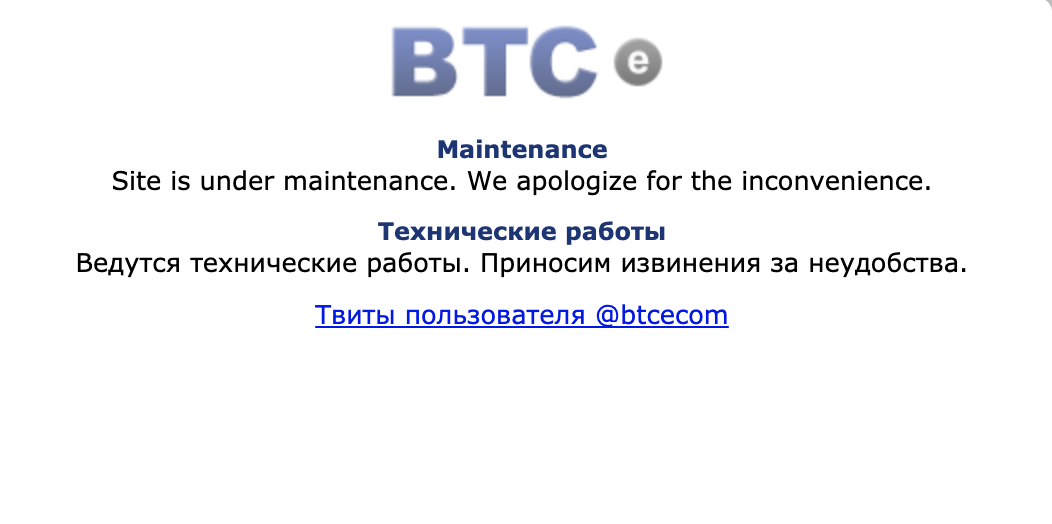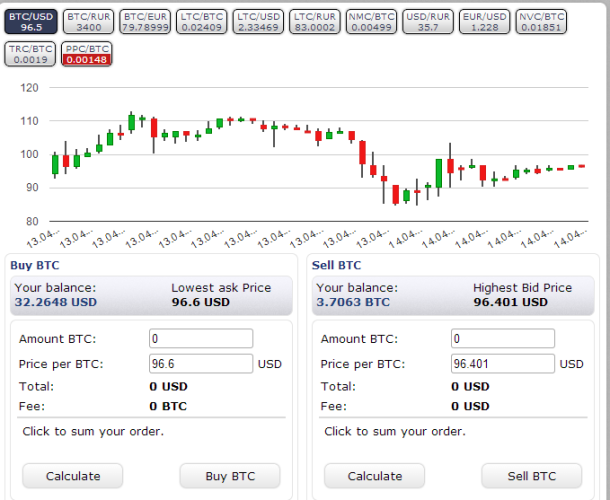
If you logged into the crypto website BTC-e on July 25, 2017, hoping to manage your crypto portfolio, you would have been greeted with this disconcerting message:

Logging on at a later date wouldn’t make any difference. The site was down. Permanently.
And that’s the boring part of the story. But we’re getting ahead of ourselves. Let’s back up.
BTC-e was a cryptocurrency trading platform founded in July 2011 and closed in 2017. It allowed trading between the U. S. dollar, Russian ruble and euro currencies, and Bitcoin, Litecoin, Ethereum, and other cryptocurrencies.
The US government closed the exchange on allegations that it was involved in laundering money for ransomware schemes. In fact, one set of security researchers estimated that BTC-e was used to convert 95% of all ransomware payments into fiat currency.
(Quick note: Ransomware is a type of malicious software that encrypts a person’s or organization’s files, making them inaccessible. The hacker who installed the software will only unlock the files in exchange for a ransom, usually paid in cryptocurrency. To turn the cryptocurrency into fiat currency, a crypto exchange like BTC-e is needed.)
One of BTC-e’s founders, Russian national Alexander Vinnik, is also believed to have played a role in the theft of 530,000 of the more than 800,000 Bitcoin stolen from Mt Gox.
Vinnik was sentenced to five years in prison in France in 2020 but is still wanted for extradition to both Russia and the US.
In this article, we’ll walk you through the history of the site, the legal (as well as illegal) purposes it was used for, and the criminal charges and convictions that came from it.
Whether it be centralized exchanges such as Binance, Kraken, and Coinbase, or decentralized protocols like Uniswap or Pancake swap, there is no shortage of options for buying, selling, and storing coins and tokens.
However, this wasn’t always the case, and for a time, the number of options was severely limited. For this reason, BTC-e rose to prominence shortly after its release in 2011, and at one point, handled 3% of all known BTC volume.
In the early years, the platform was plagued by frequent downtime, primarily due to constant DDOS attacks and server issues. However, as time went on, reliability improved, and its popularity continued to grow.

On July 25, 2017, users began complaining that any attempts to access the site were met with a message from the US Department of Justice stating that the domain had been seized due to a joint US Secret Service/FBI investigation.
According to a statement by Michael D. Ambrosio, a special agent with the USSS, “BTC-e was noted for its role in numerous ransomware and other cyber-criminal activity; its take-down is a significant accomplishment and should serve as a reminder of our global reach in combating transnational cybercrime.”

This investigation left many users without access to their funds and with many more questions than answers. However, BTC-e denied these allegations and stated that the individual arrested in connection with these crimes, the aforementioned Alexander Vinnik, was not an employee or founder of the now-defunct crypto exchange.
As a result of the investigation and seizure of the domain, the FBI reputedly came into possession of nearly 38% of all Cryptocurrencies and fiat stored on the exchange. (We could not find a statement from either the FBI or BTC-e.com that confirms the 38% figure, although BTC-e.com has apparently confirmed that the FBI took control of some of their wallets).
In response to this, those behind BTC-e launched another exchange and rebranded themselves as Wex.nz, promising to repay any customers who had lost funds from the seizure. Wex.nz was a 1:1 copy of the previous BTC-e site and sought to pick up where the old BTC-e platform left off.

Although some users reported receiving about half of their lost funds, the promised refund never materialized, and business began to slow down heavily.
After only a year of operation, Wex.nz lost many of its domain names and proceeded to disable withdrawals before shutting down completely. Unfortunately, this shutdown once again left many investors without access to their funds.
At the time of closing, Wex.nz was run by a Russian national by the name of Dmitri Vasilev, who sold the WEX.nz database to a man named Dmitri Khavchenko.
As if the story could not get any odder, Khavchenko was an ex-militia man who fought in Crimea to support Russian Annexation. Not only did he have ties to the powerful Russian Oligarch Konstantin Malofeev, but he also had plans to start a new cryptocurrency exchange using the Wex database that he planned to headquarter in Donbas, Ukraine, which was a warzone at the time.
At this point, Alexei Bilyuchenko, the ex-tech administrator of BTC-e and co-founder of Wex, was arrested in Russia as part of a criminal investigation by Russian authorities. The investigation stemmed from numerous complaints filed in Russia and Kazakhstan that millions of dollars worth of cryptocurrency were leaving Wex wallets between July and October of 2018.
Once in custody, Bilyuchenko claimed that he had been forced to send a large amount of the cryptocurrency held by Wex to wallets owned by staffers of the Federal Security Service (FSS), which as some may know, is the infamous successor to the Soviet KGB. As of now, the FSS has refused to comment on these claims.
The ex-tech admin also stated that he had been close with ex BTC-e operator Alexander Vinnik and that prior to his arrest in Greece, Vinnik had been involved in the Mt. Gox scandal and was helping hackers launder stolen bitcoins through BTC-e.
As some may know, Mt. Gox was a Japanese cryptocurrency exchange that launched in 2010 and remained in operation until February 2014. At one time, Mt. Gox handled over 70% of all Bitcoin transactions worldwide and is considered by many to be the first significant Cryptocurrency exchange.
In February of 2014, Mt. Gox stopped all trading and filed for bankruptcy protection. Shortly after this, the exchange announced that roughly 850,000 Bitcoins had been stolen from the platform.
There is a direct connection between the stolen Bitcoins, Vinnik, and BTC-e. According to WizSec, sometime around 2011, a hacker or group of hackers gained access to private keys that granted them access to a major Mt. Gox cryptocurrency wallet.
From that time, 850,000 Bitcoin was removed from the platform and laundered through a vast network of wallets across several different countries. Of the 850,000 Bitcoin taken from Mt. Gox, it is alleged that roughly 300,000 stolen Bitcoin went directly to three wallets that only BTC-e admin could access, one of which was controlled directly by Vannik.
Aside from Mt. Gox, US authorities claimed that Vannik and BTC-e had been involved in washing over 95% of all ransomware payments and that Vannik himself had a hand in developing a ransomware software called Locky.
As a result of an international warrant filed by the US, Vannik was arrested in July of 2017 while he was vacationing in northern Greece. Shortly after his arrest was made public, Russian authorities filed for extradition, hoping to bring Vannik back to Russia to try him on money laundering and fraud charges.
Because of this, Greece was put in something of a difficult position for two reasons. First, Russia was Greece’s leading supplier of both oil and natural gas, and second, the US was Greece’s most prominent NATO ally.
In a move to appease both sides, Greece sent Vannik to France in 2020, where he was eventually sentenced to five years in prison. However, a year later, Vannik was acquitted on several charges as French authorities could not prove any connection between Vannik and the distribution of the Locky ransomware software.
As of April, 2021, Vannik is still serving his jail sentence, and Russia and the United States continue to engage in a tug of war extradition battle. The contentious issue was made even worse when the US accused Russia of laundering money through BTC-e in an attempt to interfere with the 2016 presidential elections.